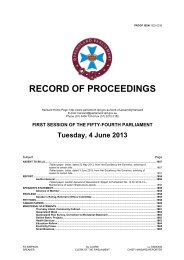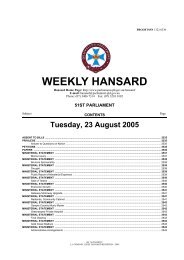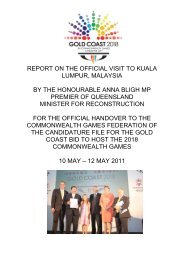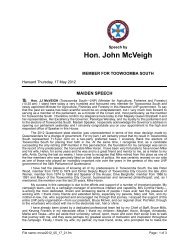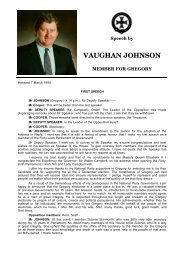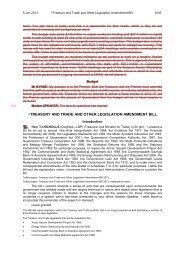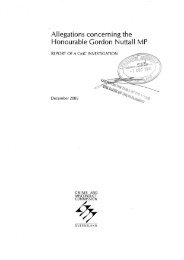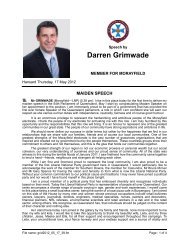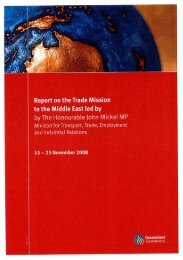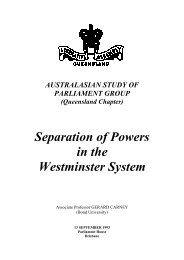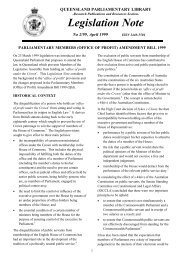Full transcript - Final - Queensland Parliament - Queensland ...
Full transcript - Final - Queensland Parliament - Queensland ...
Full transcript - Final - Queensland Parliament - Queensland ...
You also want an ePaper? Increase the reach of your titles
YUMPU automatically turns print PDFs into web optimized ePapers that Google loves.
366 Land and Resources Tribunal Bill 9 Mar 1999<br />
referee such an appeal can only be instituted<br />
with the permission of the president of the<br />
tribunal.<br />
The Scrutiny of Legislation Committee<br />
has noted that no grounds are set out in the<br />
legislation for the granting of leave. The<br />
committee has queried whether leave to<br />
appeal is necessary when appeal is confined<br />
to questions of law. It is not as if this tribunal<br />
were the High Court and special leave was<br />
needed before appeals were launched. There<br />
is, on its face, absolutely no good reason that<br />
litigants should have their rights so limited and<br />
so dependent on the exercise of broad and<br />
totally unlimited discretions.<br />
The committee has recommended that if<br />
the Government believes leave to appeal is<br />
necessary it should give consideration to<br />
prescribing grounds for the granting of leave. I<br />
ask the Premier whether he will outline to this<br />
House the reasoning behind the current<br />
requirement for leave to appeal. If there are no<br />
good reasons, then I believe that this limitation<br />
on litigants' rights should be withdrawn<br />
forthwith. However, if there are good reasons<br />
then I support the committee's call for some<br />
legislative guidance, rather than leaving the<br />
granting of leave in a totally unregulated and<br />
vague state.<br />
One final matter on which I seek some<br />
clarification relates to the provisions dealing<br />
with possible conflicts of interest by tribunal<br />
members. First, I agree that it is prudent to<br />
provide that a member must not hold or be<br />
entitled, directly or indirectly, to the benefits of<br />
an interest in a mining tenure. Having regard<br />
to the nature of most proceedings before the<br />
tribunal and the perception problems that the<br />
Wardens Court has faced, such a clause in the<br />
Bill would be desirable.<br />
I wonder why the drafters of this<br />
legislation have gone out of their way to focus<br />
just on mining activities. It is not very difficult to<br />
imagine a host of other conflicts that could<br />
arise or which could raise perceptions of<br />
conflict. One area of risk relates to the<br />
indigenous issues referee. The qualifications<br />
for appointment to this position are very<br />
precise and are set out in clause 18. I would<br />
suggest to the Government that extreme care<br />
will have to be taken in this area as well, lest<br />
the same type of perception problems that<br />
arose with the mining warden crop up here.<br />
If it is appropriate—and I think it is—that<br />
very specific prohibitions on mining interests<br />
are prescribed in clause 26, I would be<br />
interested to know why other detailed conflict<br />
provisions are also not included. I suggest that<br />
if a person is appointed as the indigenous<br />
issues referee and loses the confidence, for<br />
example, of the mining industry or landowners<br />
because of his or her links with indigenous<br />
organisations, then it will undermine the<br />
credibility of this tribunal. I ask the Premier<br />
whether any consideration was given to<br />
providing greater guidance in the Bill——<br />
Time expired.<br />
Mrs LAVARCH (Kurwongbah—ALP)<br />
(4.48 p.m.): This is the third occasion since last<br />
July that the <strong>Parliament</strong> has had before it a<br />
major legislative initiative on native title. This<br />
tells us two things. Firstly, it tells us that native<br />
title raises complex issues requiring extensive<br />
effort on the part of the Government and the<br />
<strong>Parliament</strong> to implement a fair and effective<br />
regime. Secondly, it tells us that <strong>Queensland</strong>,<br />
of all the States and Territories, is leading the<br />
way in tackling the issues thrown up by the<br />
Federal amendments to the Native Title Act.<br />
Both facts are a tribute to the Premier, as he<br />
has not only shown strong leadership for the<br />
State on a difficult question but also shown<br />
that he is willing to lead the nation. This is in<br />
stark contrast to the Leader of the Opposition,<br />
who is struggling to convince even his own<br />
party that he has the leadership qualities to<br />
keep his job, let alone lead this State.<br />
The genesis of the Land and Resources<br />
Tribunal is found in two sources. Firstly, and<br />
most importantly, there is the need for<br />
<strong>Queensland</strong> to establish a State tribunal to<br />
carry out functions prescribed by the Federal<br />
Native Title Act. Without a State tribunal,<br />
<strong>Queensland</strong> would not be able to take up the<br />
opportunity to introduce a flexible system to<br />
deal with the needs of the resource sector fully<br />
within the State's Land Management System.<br />
Secondly, there is a need to reform the role of<br />
the Mining Wardens Court within the State<br />
resources regulatory system. The need to<br />
reform this court arose out of extensive<br />
criticism of the fairness of the Wardens Court<br />
processes by landowners and a review of the<br />
court by the Department of Mines and Energy.<br />
In November last year, the <strong>Parliament</strong><br />
passed the second stage of the State native<br />
title regime. The innovation of the State<br />
regime is that it focuses on the nature of the<br />
mining interests being sought by the resource<br />
company rather than the statutory tenure over<br />
which the interest is to be granted. Now, let me<br />
explain the significance of this.<br />
As members would be aware, the Wik<br />
decision was centred on the question as to<br />
whether a pastoral lease granted to the<br />
pastoralist a right of exclusive possession to<br />
the land. By finding that a pastoral lease did<br />
not grant exclusive possession, the High Court



